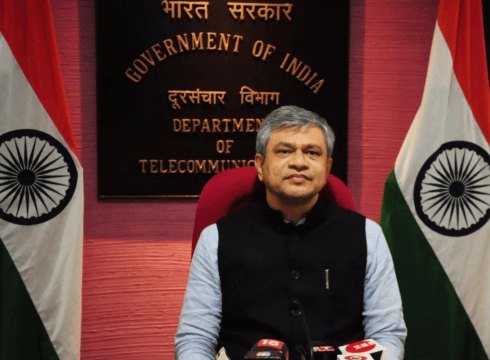Vaishnaw was speaking at the release of a set of reforms in the satcom and telecom sectors
The minister said while the department is actively consulting stakeholders, it has extended the deadline for public comments on the draft Bill to November 10
TRAI was concerned about the amendments being made to the TRAI Act of 1997 by the draft Telecom Bill, which could have greatly reduced its powers
Inc42 Daily Brief
Stay Ahead With Daily News & Analysis on India’s Tech & Startup Economy
The Union Minister of Communications Ashwini Vaishnaw said on Wednesday (October 26) that the Department of Telecommunications (DoT) has addressed the concerns of the Telecom Regulatory Authority of India (TRAI) regarding a possible dilution of power due to some aspects of the draft telecom bill 2022.
“The issues with the Telecom Regulatory Authority of India (TRAI) have now been resolved… In the draft (telecom bill), we have focused on user protection, which is central to our policymaking,” Vaishnaw said.
The minister said while the department is actively consulting stakeholders, it has extended the deadline for public comments on the draft bill to November 10. DoT set October 20 as the deadline for public comments at first. Earlier this month, the deadline was extended to October 30.
TRAI was concerned about the amendments being made to the TRAI Act of 1997, under which it was formed. The draft telecom bill proposed 13 total changes to the TRAI Act, which could have greatly reduced the powers of the watchdog.
Earlier, Broadband India Forum (BIF), said that the amendments might undermine TRAI and dilute its powers within the telecom sector and require a critical review. “The Draft Telecom Bill provisions propose to take away TRAI’s statutory independence and seek to make it subservient to the Government,” added the industry body.
Vaishnaw was speaking at the release of a set of reforms in the satcom and telecom sectors. At the event, the minister urged the telcos to increase the speed of the 5G rollout, stating that telcos should add at least 10,000 base trans-receiver stations (BTS) every week.
Right now, telcos are installing BTS at a pace of 2,500 per week.
Vaishnaw said that the government has done its part by bringing reforms and now it is up to the industry to show its commitment, referring to the sweeping reforms brought in September 2021.
These reforms were mostly aimed to reduce the increasing financial burden on the telcos, by introducing the option to defer payment of statutory dues and redefining adjusted gross revenue (AGR) dues.
National Frequency Allocation Plan Launched
At the event, Ashwini Vaishnaw also launched the National Frequency Allocation Plan – 2022 (NPAF-2022), a central policy roadmap that defines the frequency usage by all bodies, including the DoT, department of space (DoS) and the defence and I&B ministries.
“It is a master document for spectrum allocation and planning for the industry as well as policymaking. We’ll place this before the industry and the country,” Vaisnaw said of NPAF-2022.
Under the NPAF, which had been a work in progress since last year, the government has released around 17 GHz of new spectrum. The new spectrum has been released to implement 5G across its three major spectrum bands – sub-1 GHz, mid-band/C-band and mmWave.
The reforms in satcom would ease procedures and streamline clearances, increasing the pace of satcom service rollout, added Vaishnaw. The satcom reforms include the self-certification of antennas and the simplification of the NOCC process.
The move comes as several satcom players have taken a keen interest in India, including Starlink and OneWeb, among projects from companies such as Samsung, Amazon, Jio and others.
DoT has also delicenced the 865-868 MHz spectrum band, used for the internet of things (IoT) and machine-to-machine (M2M) communication. Further, the department delicenced 433-434.7 MHz spectrum for wireless charging.
{{#name}}{{name}}{{/name}}{{^name}}-{{/name}}
{{#description}}{{description}}...{{/description}}{{^description}}-{{/description}}
Note: We at Inc42 take our ethics very seriously. More information about it can be found here.


